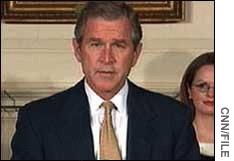|
U.S. budget surplus shrinks
|
 |
October 29, 2001: 3:50 p.m. ET
The Treasury Department and budget managers warn deficits could follow.
|
NEW YORK (CNNmoney) - The U.S. government's budget surplus shrank in 2001, the Treasury Department reported Monday, dragged down by a sluggish economy, falling tax revenue and the impact of last month's terror attacks.
The Treasury Department reported a budget surplus for the fiscal year, which ended on Sept. 30, of $127 billion, compared with $237 billion a year ago.
The news is likely to put added pressure on the administration of President Bush, which must find a way to fight terrorism, spur economic growth and protect the Social Security fund after enacting a program of tax cuts this past summer.
Excluding the Social Security system, the U.S. government ran a $33.52 billion deficit, breaching the "lockbox" that was a focus of U.S. political debate until the attacks on New York and Washington set back an already weak economy and triggered new pressures in Congress for spending and tax cuts.

|
|
|
President Bush | |
The government took in $1.99 trillion and spent $1.86 trillion while paying off about $90 billion in debt, the second-largest debt reduction in history. Though it also was the second-largest surplus in history, it was the first time since 1992 that the budget worsened.
And the government warned of the risk of deficits going forward, particularly as Congress and President Bush make plans to spend many billions of dollars to fight terrorism and spur economic growth in the wake of the Sept. 11 attacks on the World Trade Center and the Pentagon.
"Circumstances have changed radically," said Mitch Daniels, director of the Office of Management and Budget. "We must make sure that this is not the last surplus by limiting additional spending to purposes directly related to the nation's battle against terrorism."
Some economists believe the government will post a deficit in the 2002 budget year, the first shortfall since 1997, and most expect the economy to fall into a recession in the wake of the Sept. 11 attacks, if it wasn't there already.
To spur consumer spending, the Federal Reserve has cut its target for short-term interest rates nine times this year and is widely expected to do so again at its next policy meeting, scheduled for Nov. 6. 
- from staff and wire reports
|
|
|
|
|
 |

|

